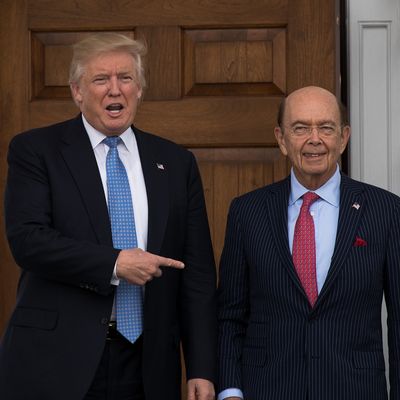
The head of the Office of Government Ethics, the federal agency charged with investigating the backgrounds of Donald Trump’s cabinet nominees, told Senate Democrats on Saturday that the process of vetting Trump’s picks is overwhelming the agency. Director Walter Shaub Jr. also emphasized his concern that Republicans are pushing forward with confirmation hearings for Trump’s nominees before the appropriate paperwork has been completed, and thus before the OGE can confirm that the nominees have no financial, ethical, or criminal red flags.
At present, Republican lawmakers expect to hold hearings on at least seven of Trump’s cabinet picks within the next several days, which Shaub says “has created undue pressure” for the watchdog agency to rush through the vetting process, and thus leaves some nominees “with potentially unknown or unresolved ethics issues shortly before their scheduled hearings.” If that scenario indeed happens, it will be a first in the OGE’s four-decade history, according to Shaub. In response to Shaub’s letter to Senate Democrats, Minority Leader Chuck Schumer accused the GOP and Trump transition team of colluding to “jam through” the nominees and sidestep the law.
Of continuing concern are the number of extraordinarily rich among Trump’s nominees, a group which includes three billionaires and is set to become the wealthiest White House cabinet in history. The New York Times reports that some of Trump’s picks are so rich that there aren’t enough boxes on the standard disclosure forms for them to list all their varied assets. Members of the executive branch are not allowed to use their positions to enrich themselves, which is why the OGE looks to identify potential conflicts of interest so they can be resolved before cabinet nominees are chosen or confirmed. (That federal law does not apply to the president or vice-president.)
In addition to Shaub’s letter, emails obtained by MSNBC through a Freedom of Information Request suggest that the OGE briefly lost contact with the Trump transition team after Trump’s election in November. According to the communication records, the agency struggled to reach and get responses from the Trump team, the staffing of which was very much in flux at the time. Both MSNBC and Politico, who also reviewed the emails, note that much of the released communication was heavily redacted, and some messages may remain unreleased due to executive privilege — so the full picture of communication between the OGE and the Trump transition team remains unclear. Regardless, the OGE did offer advice to the Trump team on topics like the appropriate structure of a blind trust with regards to Trump divesting himself from the Trump Organization. They also suggested that the Trump transition team give them advance notice of cabinet picks so they could be vetted before making their nominations public. That appears to have happened in some cases, but not in others.
The frustration over not being able to effectively communicate with Trump officials is also apparently one of the reasons the OGE posted a series of somewhat bizarre tweets in late November which seemed to encourage the idea of Trump divesting from his family business. The president-elect has yet to explain if and how he will separate himself from the Trump Organization, though he is supposed to announce those details next week.






























